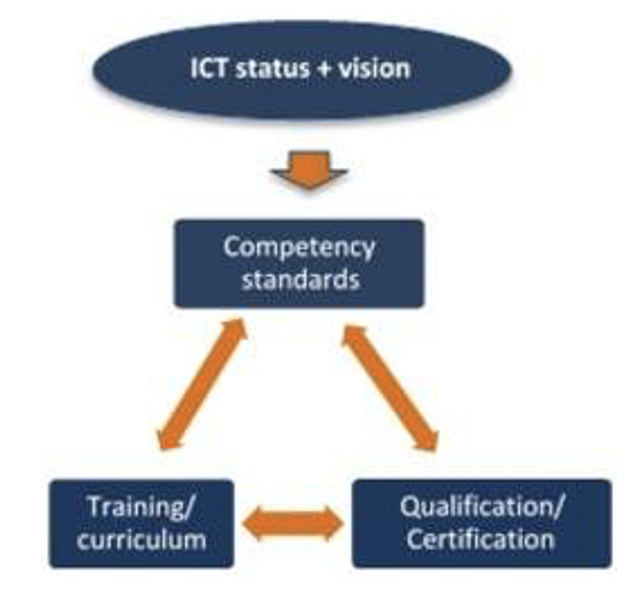Competency-Based Teacher Training Reform to Facilitate ICT-Pedagogy Integration
What?
With generous support from the Korean Funds-in-Trust (KFIT) and the Japan Funds-in-Trust (JFIT), UNESCO Bangkok provides technical assistance to Member States that would like to implement competency-based teacher training reforms to facilitate ICT-pedagogy integration. This initiative guides Member States in determining and developing the required ICT competencies for teachers that are clearly aligned with their policy vision, goals, and ICT in Education Master Plans. These national standards would serve as the basis in the development of a comprehensive roadmap that promotes competency-based teacher ICT training programmes where teachers’ development is systematically guided, monitored, assessed, and tracked at policy and institutional levels.

Riding on the success of the previously implemented "Supporting Competency-Based Teacher Training Reforms to Facilitate ICT-Pedagogy Integration” Project (supported by KFIT), UNESCO has expanded support in the national capacity building efforts to more Member States in the Asia-Pacific region. It will continue to reference from exemplary country cases featured in the Diverse Approaches to Developing and Implementing Competency-based ICT Training for Teachers: A Case Study vol 1 and the experiences of the three pilot countries (Nepal, Philippines, and Uzbekistan). The entire process and primary set of materials have been featured and are continuously updated on the online Guideline for Competency-based Teacher Training Reform to Facilitate ICT-Pedagogy Integration that consists of a package of generic tools/instruments, step-by-step guidance in developing and operationalizing the national ICT competency standards for teachers, training modules on development processes and mechanisms, and model country cases that will serve as valuable references for other governments and institutions in replicating and adapting the process in their own context.
Why?
Realizing the importance of teachers’ capacity in successfully integrating ICT into their practices, governments, teacher education institutions, private sector, and NGOs alike provide various training for teachers – ranging from how to use a particular software, to how to integrate educational technologies, to how to innovate teaching to promote 21st century skills. However, more often than not, teachers’ actual use of ICT in the classroom is reported as incremental, merely reinforcing traditional teacher-centred approaches using slides and drill-and-practice exercises. Teachers’ use of ICT to innovate teaching is an exception rather than a norm.
A close examination of lessons learned from the past ICT in Education projects of UNESCO Bangkok revealed that the needs of the Asia-Pacific region are associated with a lack of alignment and coordination between national ICT in education policy and actual teacher development on how to effectively use ICT to enhance pedagogy and student learning. One-time off-site teacher trainings hardly create any impact on teachers’ instructional practices. Inappropriate tracking and monitoring of the teachers’ development and actual use/integration of ICT in the field, along with a lack of ongoing in-school support mechanism, have also been constantly raised in the region and beyond. This ultimately leads to low capacities among teachers to support ICT-in-education policies at the practice level.
This issue has been verbalized in various regional and local meetings. In fact, in the “Asia-Pacific Regional Strategy on Using ICT to Facilitate the Achievement of SDG4” (Regional Strategy) that was endorsed by the Member States in the region in 2017, “ICT for improving the quality of teaching and teaching practices” came out as one of the four key priority areas in the region, with a special emphasis on the teacher’s central role in achieving this particular target. Towards this end, the Regional Strategy sets out the corresponding action point: “On the Quality of Teaching and Teaching Practices, Member States to develop competency standards for teachers towards ICT-integrated transformative pedagogies, and establish learning spaces and communities of practices to support teachers and share innovations.”
What's happening?
Country implementations have commenced in 2018. Key stakeholders from relevant groups have been involved in various project activities (i.e. workshops, consultations, curriculum review and enhancement, training) at different phases to contribute to the development of the national roadmap for teachers’ professional development. So far, with the support from UNESCO, the project countries have made the following progress and achievements:
- Uzbekistan developed and endorsed the national ICT Competency Requirements for Teachers (ICT-CRT) in 2016. Based on that, the teacher training curriculum was revised and modules developed. In 2018, Uzbekistan completed its draft Guidelines on ICT Competency Requirements for Teacher Assessment and conducted ToT.
- Philippines developed an ICT stream that was anchored on the developed national ICT Competency Standards for Teachers, that formed a pre-service teacher education programme with two technology courses (TTL1 and TTL2). In 2018, two national workshops for core trainers were held based on the pre-service TTL curriculum.
- Nepal developed and endorsed the national ICT competency standards for teachers in 2016, which provided the direction to drafting the syllabi for both the Basic and Proficient levels. In 2019, a special training workshop on Facilitating Student-Centered Learning through ICT allowed participants to explore ICT tools and resources that Nepali teachers can use to enhance students' learning experiences. This was followed by a national module development workshop which led to Basic- and Proficient-level draft modules.
- Myanmar developed ICT-CST within the overall Teacher Competency Standards Framework (TCSF) in 2017, which were then validated and endorsed in 2020. In 2019, Myanmar also developed a 4-year ICT Syllabus of Education Colleges, Year 1 student teacher Textbook and Teacher Educator Guide, and conducted ToT for EC ICT Teacher Educators on ICT-pedagogy integration. In 2020, Myanmar began the drafting of the Guidelines on ICT-CST based Teacher Assessment.
- Mongolia developed and endorsed its ICT-CST in 2020, serving as the basis for draft pre- and in-service teacher training course syllabi and an initial set of modules and recommendations.
- Kyrgyzstan developed its first ICT-CST draft in 2020 in line with the national education and ICT goals and visions.
- Bhutan developed and endorsed their ICT-CST within the overall Bhutan Professional Standards for Teaches (BPST) in 2019. These served as the basis for developing the draft 5-day teacher training framework for the planned National Based In-Service Programme on integrating ICT in pedagogy, and corresponding teacher training modules. In 2020, Bhutan began the drafting of the ICT-CST implementation guideline.
- Maldives developed the draft ICT-CST embedded within the general professional standards for teachers in 2019, and in line with the Education Sector Plan and Digital School Strategy. The draft ICT-CST have been integrated within the teacher education and training curricula in 2020.
Contact Information
ict.bgk(at)unesco.org








